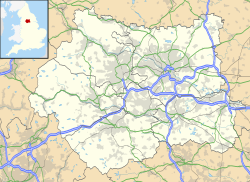
Metro is the passenger information brand used by the West Yorkshire Combined Authority in England. It was formed on 1 April 1974 as the West Yorkshire Passenger Transport Executive (WYPTE) at the same time as the metropolitan county of West Yorkshire. The Metro brand has been used from the outset, and since the formal abolition of the WYPTE on 1 April 2014, it has been the public facing name of the organisation. The transport authority of West Yorkshire, responsible for setting transport policy, is the West Yorkshire Combined Authority. The WYCA is also responsible for delivery of transport policies.

The Leyland Titan was a forward-control chassis with a front-mounted engine designed to carry double-decker bus bodywork. It was built mainly for the United Kingdom market between 1927 and 1942, and between 1945 and 1969.

Duple Coachbuilders was a coach and bus bodybuilder in England from 1919 until 1989.

The National Bus Company (NBC) was a nationalised bus company that operated in England and Wales between 1969 and 1988. NBC did not run buses itself, but was the owner of a number of regional subsidiary bus operating companies.

Arriva Yorkshire is a major bus operator providing services primarily within and across West Yorkshire, although it also provides service in some parts of South Yorkshire, East Riding of Yorkshire and southern areas of North Yorkshire. It is a subsidiary of Arriva UK Bus.

The West Riding Automobile Company was a bus company that served the Wakefield area of Yorkshire, England from 1922.

The Guy Wulfrunian was a British front-engined double-decker bus chassis produced by Guy Motors from 1959 to 1965.

The East Kent Road Car Company Ltd was a bus company formed in 1916 and based in Canterbury, Kent. The company operated bus and coach services in Kent. In 1993 it was one of the first companies to be acquired by the Stagecoach Group, which eventually rebranded the operation as Stagecoach in East Kent, and made it part of the Stagecoach South East bus division.

London Country Bus Services was a bus company that operated in South East England from 1970 until 1986, when it was split up and later sold as part of the bus deregulation programme.

Charles H Roe was a Yorkshire coachbuilding company. It was for most of its life based at Crossgates Carriage Works, in Leeds.

The Leyland Royal Tiger was a rear-engined coach chassis manufactured by Leyland between 1982 and 1987. It was intended to counter the offerings of foreign competitors such as the Jonckheere or Van Hool bodied DAF, Scania and Volvo touring coaches, but was not particularly successful, with only between 160 and 170 built.

The Leyland Panther was a rear-engined single-decker bus chassis manufactured by Leyland between the years 1964 and 1972. A version with a smaller engine was released as the Leyland Panther Cub.

Thomas Harrington & Sons was a coachbuilder in the county of Sussex from 1897 until 1966, initially at Brighton but from 1930 until the end in a purpose built Art Deco factory in Old Shoreham Road, Hove.

The Leyland Tiger Cub was a lightweight underfloor-engined chassis manufactured by Leyland between 1952 and 1970.

The Leyland Panther Cub was a rear-engined single-decker bus manufactured by Leyland from 1964 until 1968.

The Daimler Freeline was an underfloor-engined bus chassis built by Daimler between 1951 and 1964. It was a very poor seller in the UK market for an underfloor-engined bus and coach chassis, but became a substantial export success.
The Seddon Pennine RU was a rear-engined single-decker bus built by Seddon Diesel Vehicles/Seddon Atkinson between 1969 and 1974.

The Leyland Tiger was a heavyweight half-cab single-decker bus and coach chassis built by Leyland Motors between 1927 and 1968, except the period of World War II.
H. V. Burlingham was a British coachbuilding business based in Blackpool, Lancashire from 1928 until 1960 when they were taken over by London-based rivals Duple Motor Bodies. Duple initially renamed Burlingham as Duple (Northern) but in 1969 they closed their Hendon factory and concentrated production in Blackpool. Duple coach bodies were built in the former Burlingham premises until Duple itself was liquidated in 1989.

The London Bus Museum is a purpose-built transport museum, open daily to the public and located at Brooklands in Weybridge, England. Entry is on a joint basis with Brooklands Museum.

































